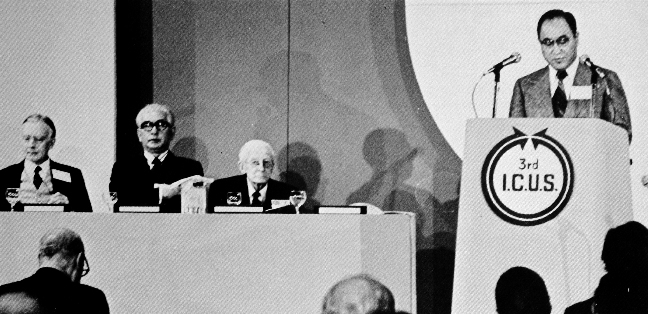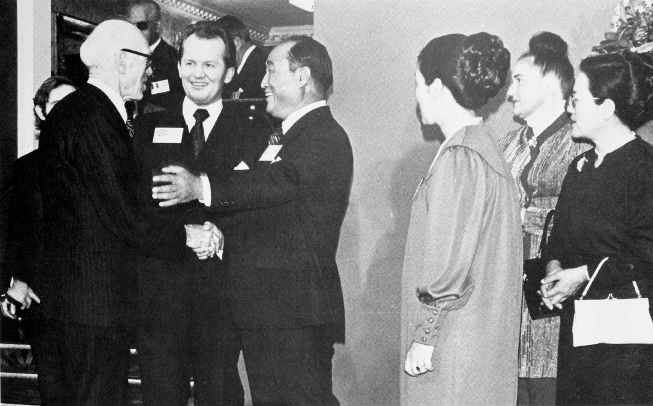![]()
The Words of Sun Myung Moon from 1974
|
|
The Words of Sun Myung Moon from 1974 |

Honorable Chairman, distinguished scientists, eminent professors and scholars, I deeply welcome all of you who are attending the third International Conference on the Unity of the Sciences sponsored by the International Cultural Foundation. As I am sure you are aware, two previous conferences have been held: the first in New York in November, 1972, and the second in Tokyo in November, 1973. As founder of the International Cultural Foundation, I have desired and done my best to create and maintain, throughout these conferences, an atmosphere in which an open and unreserved exchange of opinions could take place. And I have been greatly pleased with the fruitful results of these conferences and the participants who have contributed so much to them.
At the present time, more and more serious problems continue to develop and confront mankind. The solutions to these challenging problems call for and indeed require not partial and local approaches and ideals, but rather a global approach and the wisdom and knowledge of the many distinguished scholars gathered here at this conference.
As a scientist myself, I have been observing with keen interest the development of science and technology. I know that science and technology and what we call the "scientific method," have had a far reaching impact on human life.
Through observation and study of the world of reality, science has extended and expanded this reality beyond what can be perceived by our physical senses. We are cognizant of bacteria which we can detect only through a microscope. Some of us journey to the moon, directed by computers whose astronomical speed of calculation baffles the human mind, while others talk about making it an everyday possibility. To our naked eyes, the earth still appears flat, but science has compelled us to admit that its round. A diamond appears to be solid but we were once amazed to know that in fact, it is a scattering of atoms whirling around in quite an empty space. On a more abstract level, the transition from reality to extended reality is described by the transition from classical to quantum mechanics and from the deterministic model to the probabilistic model, both of which are equally or more confusing to common minds.
Although the progress in science has provided us with a tremendous amount of information, we still suffer from our inability to internalize this information and our inability to fully comprehend its deeper implications. This inability has led to much anxiety, confusion and uncertainty, which results from a loss of a firm basis and standard of reflection. As a result, we feel that we are in a state of imbalance between ourselves and the suddenly expanded reality caused by scientific progress.
Meanwhile, when we think of the strong probability of our finding in the spiritual world the answers to the disharmony and imbalance of the limited human function of thinking it does not seem accidental that recently Zen and meditation and their practices have become controversial objects of scientific research in the West, as well as in the East where they have so long been practiced and valued.

The study of extrasensory perception has drawn the attention of quite a number of scholars in the academic community. In particular, the discovery that a dolphin can communicate with human beings intelligently deserves notice. Along the same lines, it has been observed that plants respond to the love and other emotional states of human beings. These discoveries suggest that our present view that the animal and plant worlds are lacking in consciousness and reason may be limited. We may now as well envision a universe in which a harmonious co-existence may be brought about between human beings and other creatures, where man, being the center of all things, may serve as the spokes of the wheel turning the whole universe in ultimate harmony and oneness.
Other items worthy of notice are the roles of the educator and the medical doctor which may be drastically affected by the ability of the computer to treat enormous amounts of information accurately and promptly. Some scientists have hinted that the future study of elementary particles and cosmology may alter our concepts of space and time.
A study conducted by the Club of Rome informs us of the potentially disastrous events in the near future due to pollution, population growth, scarcity of natural resources and rapid industrialization. Recently it has been found that ozone is on the decrease, caused by repeated nuclear testing. As you all know, the presence of ozone in the atmosphere is indispensably vital to the survival of life on the earth, since destruction of protein molecules does occur in the absence of the ozone layer.
Solutions to these problems cannot be arrived at through the efforts of scientists alone, nor by the efforts of any particular individual, group or country. The study of the Club of Rome, previously mentioned, clearly indicates the finiteness of the world's resources and environs, and also makes clear the absolute necessity of a global approach and cooperative effort for proper and complete solutions to the s problems. These problems call for a world view, accompanied by an attitude of sacrifice and cooperation among all peoples of the world, transcending the interest of any one community or nation. Such a spirit of cooperation will be attained only when all mankind view themselves as members of the same human family. This revolutionary change in human consciousness to such an ideology has long been needed and is vital to s survival today.
In most educational systems in every nation of the world, the merit of competition and the survival of the fittest, achieved only by the winners in the competition, has been overly stressed. This has long been the plague undermining the healthy human endeavor to lead mankind into the world of peaceful co-existence by bringing them to be members of one human family. Now mankind somehow has begun to feel that in educating people the emphasis should be shifted and cooperation be made vital for survival. In light of this viewpoint, the goals and philosophies of education will have to undergo a profound transformation.
In the past, we have recognized the contribution of science and technology to the enrichment of human life without deep reflection. Now we begin to wonder. Some disquieting questions come to mind. Are we happier? Are we ethically more sound? Are we becoming more humane with love and concern for one another? Answers to these questions are not found simply by analyzing statistical results because the human being has many aspects which are not discretely quantifiable. In any discussion of the quality of life, these non-quaniifiable factors play a major role. As illustrations, let me cite love, the ideal, the joy of creating, belief in God, and numerous other value systems. The question of the preservation and development of these humane aspects of life remains the greatest theme of our research. In light of this theme the question of interpretation and proper use of the vast amount of information created through scientific research and discovery becomes a profound and serious one.
Our attitude which tends to overemphasize the value of science may need reexamination. A scientific truth is tentative the truth in one generation being possibly denied in the next. Consistent results, derived from a model built on the basis of a limited phenomenon, constitute scientific truth. However, in the course of building a model we go through the processes of idealization, simplification and approximation. As a consequence, we may have an approximated truth, and not the absolute truth. Science has grown so big that it sometimes seems beyond the realm of human beings.
Science should be gravely thorough and rigorous in determining facts, but in the process of utilizing the information and achievements, science should retain its position as one of the areas of human creativity. It should stay within the human realm so that it may be used and controlled and appreciated like the works of art and music. When we reflect on the history of the human race, we see that there have been new frontiers in every era, some culminating in the development of literature, and others in the blossoming of medicine or the other sciences. Yet in the past, development of science and technology has been aimed mainly at the conquest and exploitation of nature.
Today this very science compels us to set up a new ethical standard. The new ethic should concern itself with the problems of love for nature and a re-examination of human values and the need for cooperation among human beings. It should attempt to set a new view of value and a new ethical norm which can bring about an ideal world of harmonious co-existence among all creatures on the earth. The development of science and technology has certainly raised issues that invite us to seriously reflect on what is essential for us to remain human and to preserve humanity in our lives. I strongly believe that all this can be made possible only when every field of scientific technology is mobilized for the benefit of mankind and when a cooperative spirit of human activity is available on the part of the men who handle the scientific technology.
I ardently desire and expect the answers to come from you. This will surely be realized by assembling the results of your respective researches with your opinion and wisdom. From the very bottom of my heart I beg you to play the role of the bridge that will connect and lead the present world to the world of higher dimension and absolute value.
Thank you for your attentive listening!